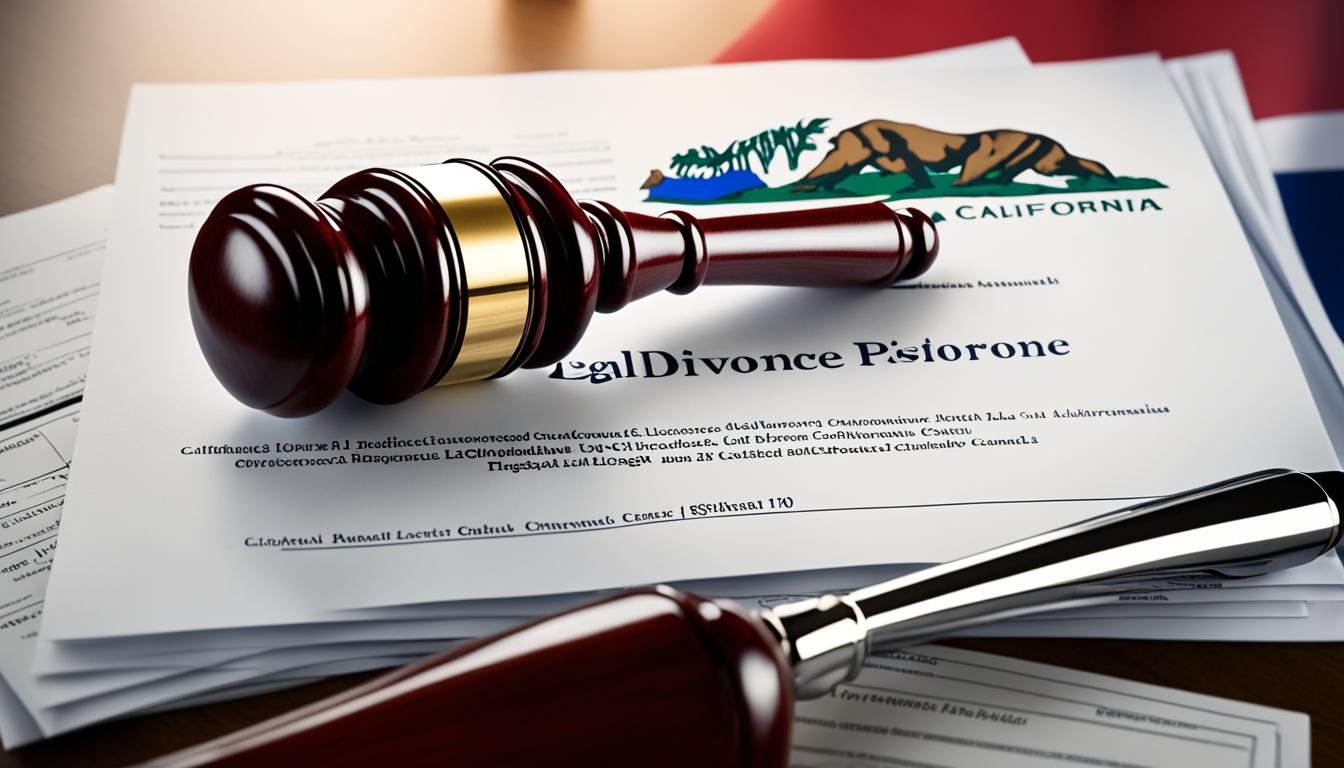Ending a marriage is a tough choice, but in California, the divorce process has clear steps. You’ll need to go through at least 10 steps, from getting ready to dealing with post-judgment issues1. If you’re thinking about divorce in California, knowing the legal steps is key. This guide will help you understand the divorce process in California. It aims to empower you to make smart choices and face the challenges ahead.
Key Takeaways
- The California divorce process involves at least 10 steps, including filing, temporary orders, financial disclosures, and obtaining a final judgment1.
- California law requires at least one spouse to be a resident of the state for 6 months and the county for 3 months before filing for divorce23.
- Filing fees for divorce in California range from $435 to $450, depending on the case23.
- Uncontested divorces in California are generally quicker and less expensive than contested divorces2.
- Consultation with a divorce attorney can provide valuable guidance on the process, your rights, and the potential outcomes1.
Introduction to the Divorce Process in California
Understanding the Basics
The divorce process in California is the same for married and domestic partners4. It includes four main steps: filing, serving papers, responding, and settling or going to trial4. This process takes at least six months to finish4.
Before starting, prepare by collecting important documents and protecting your assets. It’s also key to think about how to tell your kids. Getting advice from a divorce lawyer, like the Super Attorneys Of Irvine team at businesslawyersirvine.com, is crucial for navigating the divorce process California and protecting your rights.
4No-fault divorces are common in the U.S., starting with California in 19694. In California, divorce is mainly for irreconcilable differences or permanent legal incapacity4. You must live in California for six months and three months in the county where you file for divorce4.
4Filing for divorce costs $435 for both the petition and response, with a fee waiver for those who can’t afford it4. California splits marital assets and debts equally during divorce4. Alimony is decided based on factors like age, health, and earning capacity4.
4Child custody in California focuses on a parenting plan that looks at caregiving skills and the child’s life ties4. Child support payments are made to cover the child’s costs and can be helped with the family law facilitator for free4.

5California requires a six-month wait for a judge to finalize a divorce after papers are served5. If one spouse doesn’t respond within 30 days, they default, and the other spouse’s terms usually become the court’s decision5.
5Before a trial, couples must try other ways to solve their divorce issues5. Mediation uses a neutral third person to help couples agree on divorce terms5. Arbitration makes final decisions when couples can’t agree5.
5At trial, couples might ask for temporary orders and go through discovery5. Discovery means exchanging documents like bank and medical records5.
6About 50% of marriages in California end in divorce6. Most divorces are filed under irreconcilable differences6. Custody is a big part of 75% of divorce cases6.
665% of couples settle before trial6. 80% of divorces divide community property6. 60% of couples hire a family law attorney for the divorce process California6.
640% of divorces have temporary orders for things like child support and custody6.
Preparing for Divorce
Before you start the divorce process California, make sure you’re ready. First, collect important financial papers like tax returns, bank statements, and info on retirement accounts7. Also, update your passwords and list all your household stuff8. Getting a new credit card in your name can also help you have money during the divorce8.
Talking to your kids about the divorce should be done in a way they can understand. Make sure they know you love them and will still be involved8. A good divorce attorney California can help you know the best way to tell them7.
It’s key to learn about California’s divorce laws7. You need to live in California for six months and three months in the same county before you can file for divorce7. California also has no-fault divorce, meaning you can get divorced if you just can’t get along or if someone is insane7.
| Divorce Preparation Checklist |
|---|
|
Getting ready for the divorce process California takes planning and organization. By doing these things, you can protect your money and make things easier for your family. A divorce attorney California can give you great advice during this time.

Filing for Divorce and Serving Papers
Initiating the Legal Process
To start a divorce in California, you must file a petition with the court. This packet has forms that list the people involved and share basic info. You also need to fill out a financial form that lists your assets, debts, income, and expenses9.
Next, you must serve your spouse the divorce papers. You can do this through a professional or by mail if they agree9. Your spouse has 30 days to respond. 910, If they don’t respond, they could lose by default10. A skilled divorce lawyer can make sure these important steps are done right.
In California, the divorce process includes several key forms. These must be served to your spouse:
- FL-100 (Petition for divorce)
- FL-110 (Summons for the partner)
- FL-105 (Discuss children)
- FL-115 (Proof of service)
- FL-120 (Response form)
- FL-160 (Property declaration)
- FL-311 (Childcare plans)
Anyone serving the papers must be an adult not involved in the case, like a friend, sheriff, or postal worker9. Serving papers in California can cost up to $4509. There are five ways to serve papers, including using a process server, sheriff, mail, or serving by publication9. If your spouse lives out of state, serving papers by mail or following international rules is needed9.
“An experienced divorce attorney can ensure the proper filing and service of these critical initial documents.”
Starting a divorce in California means filing and serving papers correctly. With help from a skilled divorce lawyer, you can make the process smoother and more efficient910.
Responding to the Divorce Petition
When your spouse gets the divorce papers, they have a short time to answer in court. In California, they usually have 72 hours11 to reply. This lets them share their views on important topics like who gets the kids, support, and property.
If they don’t answer in 30 days12, the court might make a default judgment. This means they can’t really affect the divorce outcome12. It’s key to have a skilled divorce attorney California to look out for you.
The other side must give you a first disclosure within 60 days11 of being served, as California Family Code 210411 says. They also have to give you the final disclosure and details about income and expenses, unless you both agree to skip it, as California Family Code 210511 states.
Getting divorce papers can be tough, making you feel sad, angry, confused, or scared12. But, it’s important to talk to family, friends, counselors, or support groups. Also, meeting with a smart divorce attorney California can help you know what to do and protect your rights12.
“Navigating the divorce process can be daunting, but with the right legal representation, you can ensure your interests are protected every step of the way.” – BusinessLawyersIrvine.com, Super Attorneys Of Irvine
Divorce process California
Starting a divorce in California can be tough and emotional. But knowing the main steps can make it clearer and less scary13. To start a divorce here, one person must live in the county where they file for at least three months and in California for six months before filing13.
The divorce process has key stages like filing the first papers, serving them, responding, and settling or going to court13. The fastest way to end a divorce in California, even if it’s not contested, is six months13.
If a marriage lasted under five years, couples might use a “summary dissolution” for a quicker end13. This is possible if there are no kids and not many assets. But if one spouse doesn’t answer within 30 days, the other can get a default judgment, ending the divorce without both agreeing13.
Having a skilled divorce attorney is key to protect your rights and get a fair deal. At businesslawyersirvine.com, our Super Attorneys Of Irvine team offers personal legal help for those going through the divorce process California.
| Key Stages of the Divorce Process in California | Typical Timeline |
|---|---|
| Filing the Initial Petition | 6 months minimum residency requirement |
| Serving Divorce Papers | 30 days to respond |
| Responding to the Petition | 30 days to file a response |
| Reaching a Settlement or Going to Trial | 6 months minimum to finalize divorce |
Whether you’re dealing with a contested divorce, an uncontested divorce, or issues like child custody, alimony, or asset division, our divorce lawyers at businesslawyersirvine.com can guide you through the divorce process California. We aim to get you the best outcome14.
“Navigating the divorce process can be daunting, but with the right legal support, you can emerge from this chapter with your rights and interests protected.”
For more on divorce laws California and how our Super Attorneys Of Irvine can help, visit businesslawyersirvine.com or call us today at [phone number]. We’re ready to support you through the divorce process California and work for a good outcome for you and your family14.
Reaching a Settlement or Going to Trial
You and your spouse must settle complex issues like child custody and asset division after filing15. You can do this through negotiation, mediation, or a trial15.
An uncontested divorce is faster and cheaper than a contested one16. Yet, it’s wise to have a skilled divorce lawyer check any settlement to protect your rights15. Super Attorneys Of Irvine can guide you on the best steps for your situation.
Negotiating the Terms
If you and your spouse can’t agree, you might go to trial15. About % of California divorces end in trial over complex issues15. Disputes over property division or hidden income can lead to trials17.
Even at trial, you might settle before the trial date15. In fact, % of California trials end in settlement during preparation15.
Whether your divorce is uncontested or contested, having a skilled lawyer is key15. Super Attorneys Of Irvine can help you through the process and aim for the best outcome for your family.
“Going to trial offers a chance for better outcomes, like more assets or custody rights, if negotiations fail.”16
| Outcome | Percentage |
|---|---|
| Cases that end up going to trial on all contested issues | 177 out of 10 |
| Cases that file for and obtain temporary orders | 173 out of 10 |
| Cases that involve motions to modify support, custody, or visitation orders post-judgment | 179 out of 10 |
| Cases where a Stipulated Judgment is prepared | 171 out of 10 |
| Cases that involve filing for default judgment without the other party’s response within 30 days | 17Approximately 1 out of 10 |
| Cases that lead to a Mandatory Settlement Conference to resolve contested issues before trial | 17Approximately 5 out of 10 |
Obtaining a Final Judgment
Getting a court-approved final judgment is key in the divorce process California. This judgment, or divorce decree, ends your marriage. It lets you start fresh18. You and your spouse must divide your stuff, debts, and figure out child care and support if needed18.
The court checks the divorce forms and settlement agreement you filed18. If all looks good, the judge signs the final divorce judgment. This makes you and your spouse legally divorced18. This ends the divorce filing California process, giving you the papers to prove your divorce is final.
At businesslawyersirvine.com, our Super Attorneys Of Irvine team will help you with this last step. We know divorce is tough, both emotionally and legally. We aim to make the divorce paperwork California process easier and get you your final judgment with less stress.
“The final judgment is the key to moving forward with your life after a divorce. Our attorneys will work diligently to ensure the process is handled properly and efficiently.”
If you have questions or worries about getting your final divorce judgment, contact us at businesslawyersirvine.com. Our Super Attorneys Of Irvine team is here to help you at every step.
Conclusion
Going through a19 divorce in California can be tough, but with help from a skilled divorce lawyer at Super Attorneys Of Irvine, you can get through it. They can guide you through the process and make sure your rights are protected. You might be going for an20 uncontested or contested divorce. The steps include filing a divorce petition, serving your spouse, responding, and either settling or going to trial for a final decision20.
Having a lawyer who knows what they’re doing is key. They make sure you file and serve papers correctly and fight for what’s best for you. At Super Attorneys Of Irvine, they’re ready to walk you through every part of the19 divorce process. They’ll help you with things like residency rules, temporary orders, financial details, and settling on your divorce terms20.
No matter how complicated your case is, with issues like19 child custody19, alimony, or dividing assets and debts, the lawyers at Super Attorneys Of Irvine aim to get you the best outcome. They’ll support you every step of the way, making sure your rights and interests are looked after during the19 divorce process in California.
FAQ
How long does the divorce process typically take in California?
What are the major steps in the California divorce process?
Do the same divorce process steps apply to both married couples and domestic partners in California?
What should I do to prepare before filing for divorce in California?
Do I need to hire a divorce attorney in California?
What happens after I file the divorce petition in California?
What if my spouse doesn’t respond to the divorce petition in California?
How are issues like child custody, support, and asset division resolved in a California divorce?
What is the final step in completing the divorce process in California?
Source Links
- https://cristinlowelaw.com/california-divorce-process-ten-steps/
- https://divorce.com/blog/california-divorce-process/
- https://hooverkrepelka.com/guide-divorce-california-step-by-step-process/
- https://www.forbes.com/advisor/legal/divorce/california-divorce/
- https://www.sachdevfamilylaw.com/california-divorce-process/
- https://www.keithfcarr.net/california-divorce-process/
- https://divorce.com/blog/california-divorce-checklist/
- https://www.zeppyattashian.com/preparing-for-a-divorce/
- https://hellodivorce.com/divorce-in-california/how-to-serve-divorce-papers
- https://www.orangecountyfamilylaw.com/blog/how-to-serve-divorce-papers-in-california/
- https://www.leonfbennettlaw.com/blog/what-happens-in-california-after-divorce-papers-are-filed/
- https://temeculadivorce.com/step-by-step-guide-responding-divorce-papers/
- https://www.edgarfamilylaw.com/blog/california-divorce-process-step-by-step/
- https://www.occourts.org/divisions/family-law/divorce-legal-separation-annulment
- https://selfhelp.courts.ca.gov/divorce/trial
- https://www.forbes.com/sites/frawleypollock/2020/02/18/divorce-dilemma-settle-or-go-to-trial/
- https://www.lacourt.org/selfhelp/willsestatestrusts/pdf/divorce_overview_pru1.pdf
- https://www.jlegal.org/blog/the-basic-8-steps-in-divorce-filing/
- https://provinziano.com/divorce/the-divorce-process-in-california-a-step-by-step-guide/
- https://sullivan-law.com/8-steps-to-divorce-in-california/

